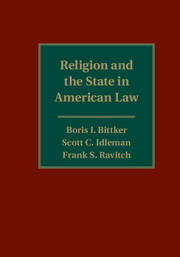Book contents
- Frontmatter
- Dedication
- Contents
- Preface
- 1 History and Introduction
- 2 Church and State in the Nineteenth Century
- 3 Religious Influences and Expressions in Law and Government
- 4 The Establishment Clause
- 5 The Free Exercise Clause
- 6 The Religious Test, Equal Protection, and Free Speech Clauses
- 7 The Definition of Religion
- 8 Church Property Disputes and Church Schisms
- 9 Contracts
- 10 Taxation
- 11 Employment
- 12 Land Use
- 13 Torts
- 14 Criminal Law and Process
- 15 Family Law
- 16 Public Education
- 17 Religious Symbolism on Government Property
- 18 Special Contexts: Prisons and the Military
- Appendix A Federal Constitutional Provisions
- Appendix B State Constitutional Provisions
- Appendix C Selected Federal Statutes 910
- Index
Appendix B - State Constitutional Provisions
Published online by Cambridge University Press: 05 October 2015
- Frontmatter
- Dedication
- Contents
- Preface
- 1 History and Introduction
- 2 Church and State in the Nineteenth Century
- 3 Religious Influences and Expressions in Law and Government
- 4 The Establishment Clause
- 5 The Free Exercise Clause
- 6 The Religious Test, Equal Protection, and Free Speech Clauses
- 7 The Definition of Religion
- 8 Church Property Disputes and Church Schisms
- 9 Contracts
- 10 Taxation
- 11 Employment
- 12 Land Use
- 13 Torts
- 14 Criminal Law and Process
- 15 Family Law
- 16 Public Education
- 17 Religious Symbolism on Government Property
- 18 Special Contexts: Prisons and the Military
- Appendix A Federal Constitutional Provisions
- Appendix B State Constitutional Provisions
- Appendix C Selected Federal Statutes 910
- Index
Summary
Alabama
Ala. Const. preamble: We, the people of the State of Alabama, in order to establish justice, insure domestic tranquility, and secure the blessings of liberty to ourselves and our posterity, invoking the favor and guidance of Almighty God, do ordain and establish the following Constitution and form of government for the State of Alabama:
Ala. Const. art. I, § 3: That no religion shall be established by law; that no preference shall be given by law to any religious sect, society, denomination, or mode of worship; that no one shall be compelled by law to attend any place of worship; nor to pay any tithes, taxes, or other rate for building or repairing any place of worship, or for maintaining any minister or ministry; that no religious test shall be required as a qualification to any office or public trust under this state; and that the civil rights, privileges, and capacities of any citizen shall not be in any manner affected by his religious principles.
Ala. Const. art. I, § 3.01:
Section I. The amendment shall be known as and may be cited as the Alabama Religious Freedom Amendment.
Section II. The Legislature makes the following findings concerning religious freedom:
(1) The framers of the United States Constitution, recognizing free exercise of religion as an unalienable right, secured its protection in the First Amendment to the Constitution, and the framers of the Constitution of Alabama of 1901, also recognizing this right, secured the protection of religious freedom in Article I, Section 3.
(2) Federal and state laws “neutral” toward religion may burden religious exercise as surely as laws intended to interfere with religious exercise.
(3) Governments should not burden religious exercise without compelling justification.
(4) In Employment Division v. Smith, 494 U.S. 872 (1990), the United States Supreme Court virtually eliminated the requirement that the government justify burdens on religious exercise imposed by laws neutral toward religion.
- Type
- Chapter
- Information
- Religion and the State in American Law , pp. 880 - 909Publisher: Cambridge University PressPrint publication year: 2015



